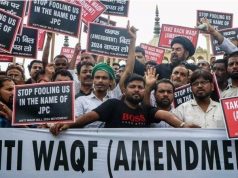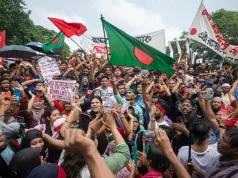
One of the most severe types of injustice occurs when the oppressor pretends to be the victim and falsely accuses the oppressed person of being brutal.
As I sit here typing this article, the most horrific incident in human history is happening right now. The Al-Shifa hospital in Gaza City has been occupied by the Israeli military. Upon assuming control of the premises, they promptly issued an evacuation order for the hospital, and simultaneously established sniper positions outside the entrance. There is a considerable number of individuals, potentially reaching up to 9,000, currently hospitalised due to various injuries. Among this population, women and children make up the majority, including medical professionals such as doctors and nurses. Furthermore, International peace and security organisations, such as the United Nations, the Organisation of Islamic Cooperation (OIC), and the Arab League, have been indirectly supporting Israel.
People are now considering how they can support and assist Palestinians who are at risk due to the imminent ground invasion of the densely populated Gaza Strip. The BDS movement, which stands for boycott, divestment, and sanctions against Israel, is a potential option that individuals worldwide can adopt to exert pressure on Israel and potentially influence its policies.
The BDS movement has resurfaced since the last month and McDonald’s and Starbucks are among the nonviolent movement’s targets. Moreover, McDonald’s, Domino’s Pizza, and Burger King are being targeted after an Israeli outlet gave the Israeli soldiers free meals. Starbucks sued its labour union last month over a union social media account supporting Palestinians, facing boycotts. Simultaneously, global demonstrations led by local groups associated with the BDS movement are happening.
Nonviolent resistance or civil resistance is considered a type of asymmetric warfare that offers a means for the oppressed to exert coercive force. In some cases, this approach has demonstrated a higher rate of success compared to violence and often leads to the establishment of more socially just political systems. Throughout history, nonviolent resistance has proven to be an effective strategy for achieving social and political change. Examples include the American Revolution, where colonists successfully used nonviolent resistance campaigns to gain independence from British rule. Similarly, Hungarian nationalists engaged in nonviolent resistance to regain self-governance from Austrian rule in the mid-19th century. The Indian independence movement led by Mohandas Gandhi is another well-known example of nonviolent struggle, which ultimately resulted in India’s independence from British colonial rule. Even during World War II, small groups such as the White Rose and the Confessional Church in Germany employed nonviolent techniques against the Nazis. In the United States, the Civil Rights Movement of the 1960s utilized nonviolent resistance to challenge segregation and discrimination, with leaders like Martin Luther King Jr. advocating for this philosophy. These examples highlight the historical significance and success of nonviolent resistance as a means. However, Scholars such as Frantz Fanon assert that violence is not only justified but necessary. Fanon argues that the colonised or oppressed should establish political organisations to overthrow their colonial masters or oppressors. in the Palestinian context, the author also supports this perspective.
The Boycott, Divestment, and Sanctions (BDS) movement, inspired by the South African anti-apartheid movement, is a global movement for the Palestinians that employs three interdependent persuasive pressure tactics: boycott, divestment, and sanctions. It aims to pressure the state of Israel to comply with international law regarding its policies in the Palestinian territories. In 2005, Palestinian civil society organisations initiated a campaign known as Boycotts, Divestment, and Sanctions (BDS) with the aim of exerting non-violent pressure on Israel. The BDS movement was initiated by a coalition of 170 Palestinian civil society organisations, including trade unions, political parties, refugee networks, women’s organisations, professional associations, popular resistance committees, and other civil society bodies. Various individuals and organisations worldwide, including student groups, professional organisations, city councils, and activist groups from countries such as the United States, Canada, India, South Africa, Ireland, the United Kingdom, France, Spain, Italy, Germany, the Netherlands, and Israel, have responded to this call. The BDS movement advocates nonviolent resistance and calls for nonviolent pressure on Israel until it adheres to international law by fulfilling three demands: ending the occupation of all land acquired in 1967, acknowledging the fundamental rights of Arab-Palestinian citizens of Israel to full equality, and upholding the rights of Palestinian refugees to return to their homes and properties as outlined in UN resolution 194.
BDS in India
Indian people have consistently supported the Palestinian cause throughout history. M.K. Gandhi perceived the Palestine issue through the lens of justice and compassion. He strongly asserted that “Palestine belongs to the Arabs in the same sense that England belongs to the English or France to the French.” He spoke against the forced settlement of Jews in Palestine, considering it both wrong and inhumane. In this regard, the conference titled “A Just Peace for Palestine” took place in September 2010 in New Delhi, India. It concluded with a strong endorsement of the boycott, divestment, and sanctions (BDS) movement to achieve justice for Palestinians. The event was jointly organised by the Palestinian BDS National Committee (BNC), the Committee for Solidarity with Palestine, the All India Peace and Solidarity Organisation, and the newly formed Indian Campaign for the Academic and Cultural Boycott of Israel (INCACBI). The conference concluded by adopting a resolution urging the Indian government to suspend its military ties with Israel and reaffirm its previous dedication to the Palestinian people.
Impact of the BDS Movement
According to a 2015 report by the Rand Corporation, a global policy think tank, Israel’s gross domestic product (GDP) is projected to experience a loss of approximately $15 billion due to nonviolent Palestinian resistance, including the BDS. According to a recent report by Bloomberg, foreign investment in Israel experienced a significant decline in 2023. This decline is likely attributed to the political and social unrest in the country. As a result, the Israeli government has tried to suppress BDS campaigns ever since their inception. A law prohibiting individuals who support boycotts from entering Israel was enacted in 2017.
In addition to lobbying and propaganda efforts, there is a notable transnational strategy aimed at suppressing BDS through the instrumentalization of legal mechanisms. Over the past few years, numerous legislative measures aimed at curbing boycotts and activism in support of Palestinian rights have been proposed and implemented in the United States. So far, twenty-seven states have enacted anti-BDS laws, which include five executive orders issued by state governors. Similarly, France, Britain, and other Western European countries also exhibit this characteristic. The implementation of anti-BDS measures globally demonstrates the effectiveness of the BDS movement.
In conclusion, many studies have demonstrated that the movement may be effective as armed resistance in attaining major political goals and peacefully transitioning from authoritarian government to democracy. Although, the movement is accused of antisemitism and wishing to eliminate Israel as a Jewish state. Despite these claims, the BDS movement has received support from notable public figures, gaining significant momentum and effectively challenging international support for Israeli apartheid and settler colonialism. Additionally, the imposition of sanctions played a significant role in weakening the apartheid regime in South Africa. The Palestinian struggle has undergone various phases and may now be in its final stage of seeking a homeland. Furthermore, If the Gaza war is prolonged, there is expected to be a breakout in revolt and resistance among the Arab population, like what happened during the Arab Spring. People will not remain mute regarding what they perceive to be Arab leaders’ betrayal. Although it might not happen soon, however, the end of Israel is inevitable.





